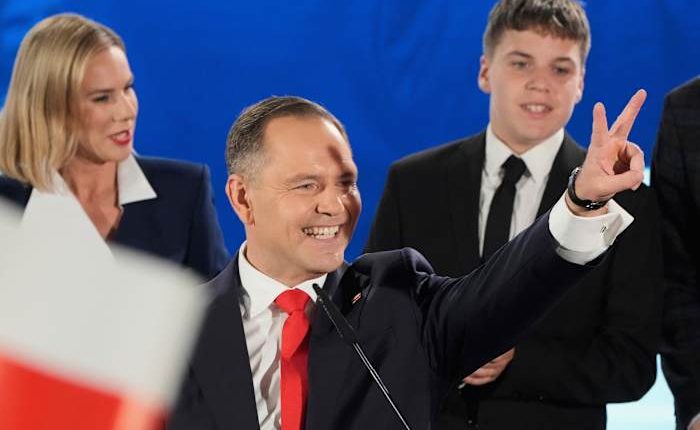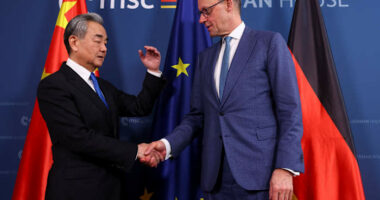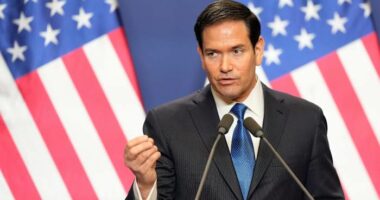Share this @internewscast.com

WARSAW – Poland has chosen Karol Nawrocki, a conservative historian known for his strong nationalistic views, as its new president in a high-profile election, reflecting a revival of right-wing populist trends in central Europe.
Nawrocki, who will assume his role on Aug. 6, is anticipated to influence Poland’s domestic and international policies, potentially leading to tensions with Brussels while seeking closer ties with President Donald Trump’s administration in the U.S.
Here are some key takeaways:
Conservative populism on the rise
His triumph highlights the lasting appeal of nationalist discourse to a significant portion of the Polish population, particularly in the eastern stretch of NATO and the EU, and points to the significant social fragmentation within the country.
The 42-year-old historian who had no previous political experience built his campaign on patriotic themes, traditional Catholic values, and a vow to defend Poland’s sovereignty against the EU and larger European nations like Germany.
His win also reflects the appeal of right-wing nationalism across Europe, where concerns about migration, national sovereignty, and cultural identity have led to surging support for parties on the right — even the far right in recent times.
Far-right candidates did very well in Poland’s first round of voting two weeks earlier, underlining the appeal of the nationalist and conservative views. Nawrocki picked up many of those votes.
As his supporters celebrate his win, those who voted for the defeated liberal candidate, Warsaw Mayor Rafał Trzaskowski, worry that it will hasten the erosion of liberal democratic norms.
Prime Minister Donald Tusk’s troubles
Nawrocki’s presidency presents a direct challenge to Prime Minister Donald Tusk, who returned to power in late 2023 pledging to mend relations with the EU and restore judicial independence which Brussels said was eroded by Law and Justice, the party that backed Nawrocki.
But Tusk’s coalition — a fragile alliance of centrists, leftists, and agrarian conservatives — has struggled to push through key promises including a civil union law for same-sex couples and a less restrictive abortion law.
Nawrocki, who opposes such measures, will have the power to veto legislation, complicating Tusk’s agenda and potentially triggering political gridlock.
Ties with the Trump administration
Nawrocki’s election could signal a stronger relationship between Poland and the Trump administration.
Poland and the U.S. are close allies, and there are 10,000 U.S. troops stationed in Poland, but Tusk and his partners in the past have been critical of Trump. Nawrocki, however, has a worldview closely aligned with Trump and his Make America Great Again ethos.
Trump welcomed Nawrocki to the White House a month ago and his administration made clear in other ways that he was its preferred candidate.
A shifting focus on Ukraine
While Nawrocki has voiced support for Ukraine’s defense against Russian aggression, he does not back Ukrainian membership in NATO and has questioned the long-term costs of aid — particularly support for refugees.
His rhetoric has at times echoed that of Trump, for instance by accusing Ukrainian President Volodymyr Zelenskyy of what he said was insufficient gratitude for Poland’s assistance. With growing public fatigue over helping Ukrainian refugees, Nawrocki’s approach could shift Poland’s posture from strong ally to conditional partner if the war drags on much longer.
Ties with the EU
The election result is a setback for the EU, which had welcomed Tusk’s return in 2023 as a signal of renewed pro-European engagement.
Nawrocki and the Law and Justice party have criticized what nationalists view as EU overreach into Poland’s national affairs, especially regarding judicial reforms and migration policy.
While the president does not control day-to-day diplomacy, Nawrocki’s symbolic and veto powers could frustrate Brussels’ efforts to bring Poland back into alignment with bloc standards, particularly on rule-of-law issues.
Market jitters
Though an EU member, Poland has its own currency, the zloty, which weakened slightly on Monday morning, reflecting investor concerns over potential policy instability and renewed tensions with EU institutions.
Billions of euros in EU funding has been linked to judicial reforms which Tusk’s government will now be unlikely to enact without presidential cooperation.
Copyright 2025 The Associated Press. All rights reserved. This material may not be published, broadcast, rewritten or redistributed without permission.











